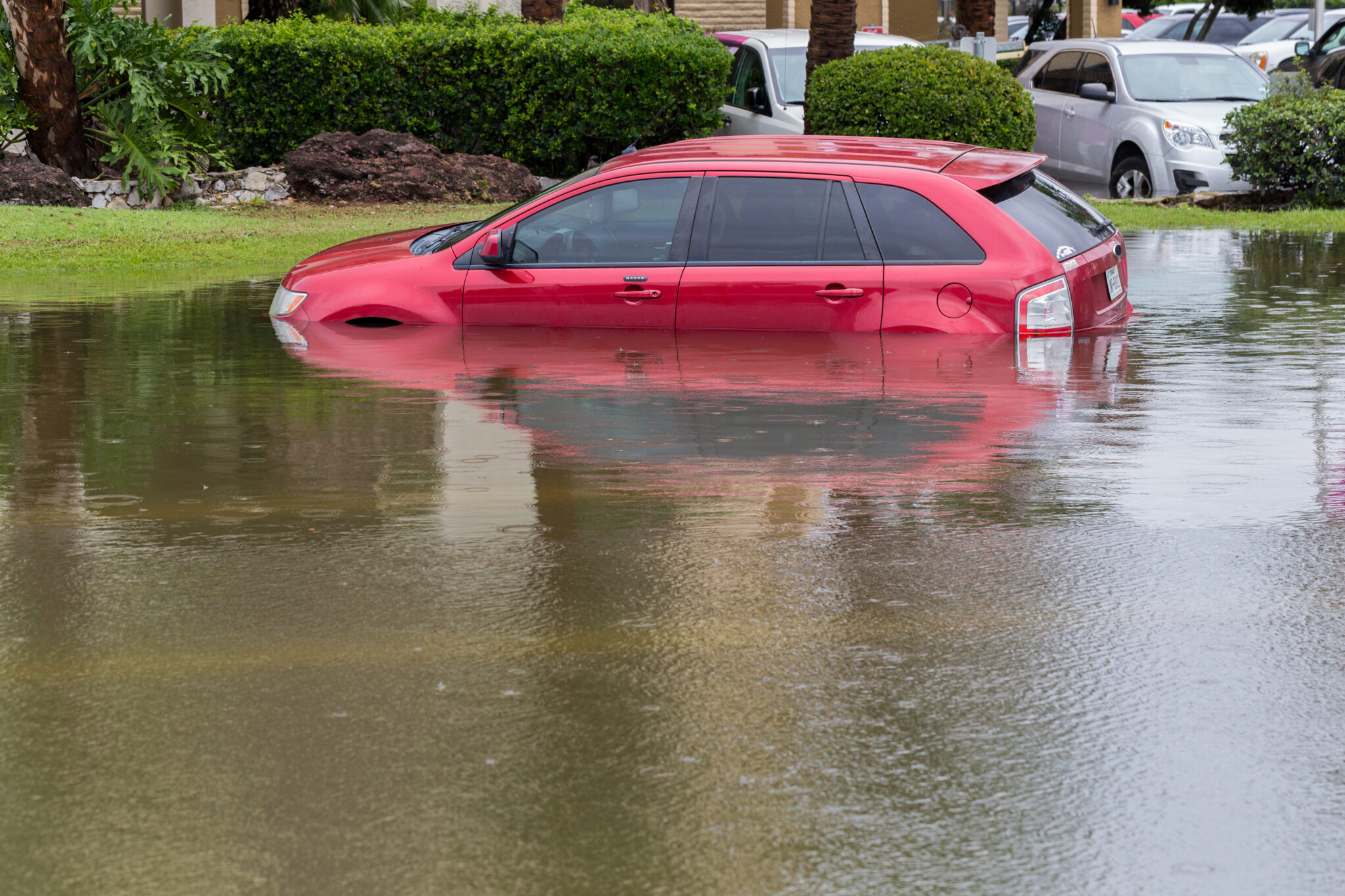Water damage is expensive and can render your car undrivable or a total loss. It can happen randomly, especially if you live in an area that has frequent floods. Fortunately, comprehensive coverage protects you from random events like flooding and other natural disasters.
Your comprehensive won’t always come in to save the day, though. If the damage is your fault, your provider won’t pay for repairs. Insurers and attorneys refer to this as negligence on your part. This isn’t always the case. But if it is, your insurance can’t help you.
In this article:
- Water events covered by insurance
- When flooding totals your car
- How to file a claim
- other water protections for your car
- Frequently asked questions
Water Events Covered by Insurance
When vehicles have water damage, floods are probably the first thing to pop into your head. But there are plenty of ways moisture can get into and wreck your car. Your comprehensive insurance should be able to handle most causes. If you have a full-coverage policy, then you have it. Liability and collision will not step in to pay for any water damage.
Below is a list of the most common causes of water damage that auto insurance covers:
- Floods. This is, of course, the main reason water gets into vehicles. Hurricanes and intense rain can cause urban flooding and rising water levels on the road. Floods can ruin vehicle interiors and engines.
- Leaks. Heavy rain can cause leaks to occur. This can cause serious problems to vehicle interiors.
- Hailstorms. Hailstorms can shatter your windshield, causing rain to flood your car. Your comprehensive insurance helps cover the expenses from hail.
- Vandalism. If a vandal broke your windows, causing water damage, your comprehensive should cover this. Comprehensive would cover both your windows and the flood damage. Keep in mind that you may have to file two claims – one for the water damage and the other for the windows.
The similarity between all of the above is that they aren’t your fault. Comprehensive will generally protect you from damage that you didn’t cause.
Uncovered Water Events
There are some occasions when auto insurance won’t cover water damage. This is mainly where you’re at fault. Here are the common situations where you’ll have to pay out-of-pocket:
- You left the windows open
- You accidentally drove into a body of water
- Poor car maintenance. For example, not addressing broken windshields or windows, resulting in water leaks
When Flooding Totals Your Car
Flood and water damage can often be so severe that it will total your car. A total loss means that the repairs will cost more than what your car is worth. It’s common for floods to cause water to get into your engine and cause irreparable damage.
Water can also spread to your vehicle’s interior and ruin it. This is especially common in newer cars, where high-tech electronics an superconductor chips are susceptible to damage. It’s best to prepare yourself for your car being a total loss if it’s been submerged.
What to Do If Water Damage Totals Your Car
This is a tough situation to be in. You only have a few options:
- Keep the car. You can always spend the money and repair your car back to drivable status. You’ll need to get a rebuilt title to legally drive it again. Repairs could cost a lot and your premium will likely be more expensive.
- Get a new car. This is probably the path that most people will take. If your car is a total loss, it might be best to just cut your losses and buy a new car.
After a total loss declaration, you’ll receive a payout equal to the actual cash value (ACV) of your car.
Something else to keep in mind is that you might still have a loan on your totaled car. You’re still responsible for paying this off. Guaranteed asset protection or Gap coverage will help you in this case. It will pay the gap between the car’s ACV and the balance of your loan.
How to File a Claim
If your car has water damage, you’ll want to file a claim with your provider. Filing a claim is fairly simple. Here are some tips you should consider if you go to report a claim:
- Be sure to document any property damage if you can. The best way to do this is with photos and videos so that your insurer can see everything
- Get the contact information of your insurance adjuster. This way you can ask questions, such as for an estimate of your payout
- Understand that factors like vehicle make and model, age, mileage, damage extent, and type will affect how much you’ll receive in a payout
- Try to assess the extent of water damage. If the damage is less than your deductible it doesn’t make a lot of sense to file a claim. Minor damage is best paid for out-of-pocket without involving your insurer.
Be sure to speak with your agent if you have any questions about filing a claim. They’ll help you make sure you’re doing everything correctly. This way you’ll receive the correct payout.
Will filing a Claim Raise Your Rates?
This is a common question that people ask before they file a claim. The answer is simple: it depends. You shouldn’t expect your rates to rise much or even at all after filing one comprehensive claim. It wasn’t your fault, after all.
You should expect your rates to go up if you have a track record of claims. It’s a good idea to speak with your provider or agent to find out if filing a claim will affect your rates.
Is It Worth It to File a Claim?
Flood and water damage repair costs are significant. The bill could be in the thousands of dollars, and probably a lot less than your deductible. When your mechanic hands you an estimate, do the math and you’ll see that paying out of pocket doesn’t make sense. This is especially true if your car is a total loss. Filing a claim will get you a payout from your insurer to cover these expensive repairs.
Other Protections for Your Car
Comprehensive covers damages after a flood or leak, but there are other policy add-ons that are useful following either event. Roadside assistance can come in handy in other situations as well. You may not need rental car insurance very often, but it’s something to consider during rainy seasons in areas prone to flooding.
Rental Car Coverage
You’ll want to think about buying additional coverage when renting a vehicle. Floods and other random destructive events can happen unexpectedly and you may be in unfamiliar territory. So, this type of protection is a good idea.
Your policy may automatically cover rental cars. Before adding additional coverage, make sure to check with your provider to see if your auto insurance carries over to rental cars.
Roadside Assistance
Roadside assistance coverage is helpful if you find yourself stuck in a flood or are unable to drive. It’ll cover the expenses if you need roadside assistance or towing service. If you don’t have this and you’re stuck on the side of the road, you’ll end up paying for the service in full.
Roadside and towing services could cost hundreds of dollars. The price you pay will depend on what level of service you need. Your current insurer most likely offers this coverage, but check out our article on the best roadside assistance coverage. Ask your agent or get a quote to find out how much adding this coverage costs.
Frequently Asked Questions
Does my policy insure my car from flood damage?
Yes, it does. Your comprehensive insurance coverage will pay for expenses and repairs after a flood. However, it won’t cover damage to your car that’s your fault. For example, driving into a flood zone that your city has warned drivers about could result in your insurer not paying out your claim. Driving into a body of water you could’ve avoided is your fault.
How long does it take for water damage to affect a car?
Water damage isn’t always immediately evident. It can take weeks, months, or even years for problems caused by moisture to appear. Corrosion is a long, slow process that can render your car’s vital safety features to fail when you need them most. The computer circuits that regulate airbags and anti-lock brakes are not designed to be submerged for any amount of time.
Does flood or water damage total a vehicle?
Floods and water in general can damage a vehicle so severely that your insurance company totals it. Water can get into your car’s engine or interior, both of which use hundreds of computer chips. If it does, all of the technology that goes into modern vehicles could be ruined. When that happens the expense to repair a car to its original condition can exceed it’s value. If a vehicle’s repair estimate tops it’s Blue Book value, your insurer can total it. Many states use a Total loss formula or TLF to determine the damage percentage necessary for your insurer to declare cars a total loss.
Don’t worry, insurance still covers your car if it’s totaled. You would receive a cash payout that’s equal to the car’s actual cash value. Then it’ll be up to you to pay off any loans (if you have them) and decide whether or not you want to keep the car. Cars with flood or water damage are often difficult to repair back to roadworthy status because of how significant the damage can be.
Will my auto policy cover water damage from leaving the window open?
Unfortunately, your policy won’t cover any damages that were your fault. Leaving the window open falls under this category. In this case, you’ll have to pay for the repairs in full. The same holds true for situations where you left your sunroof open and your car’s interior suffers water or moisture damage.


